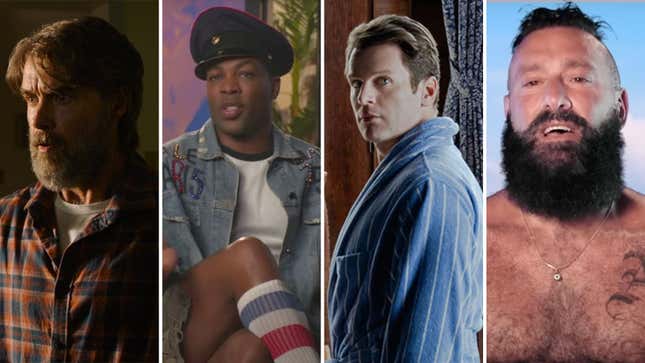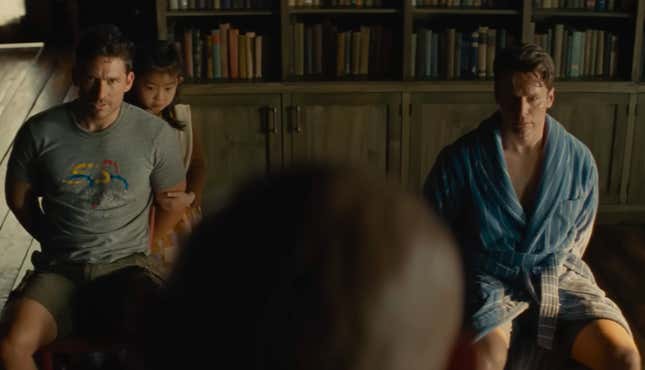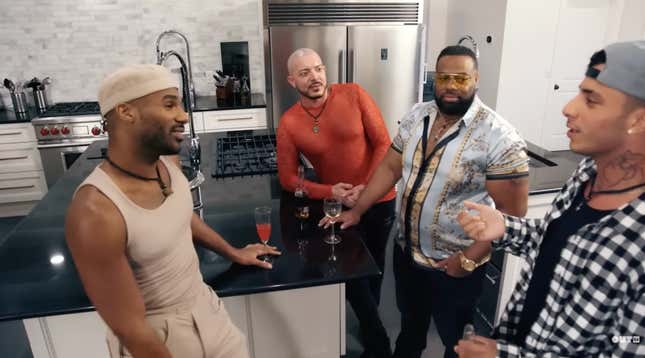The Springtime of Gay Pop Culture
All of a sudden, we’re being treated to (and sometimes insulted by) a crop of movies and TV shows that center cis gay men.
Entertainment

What a nice surprise this moment in pop culture is for those who care about seeing gay people on screen. A crop of gay-themed movies and television shows sprung up like a nonfatal fungus in recent weeks—something that seemed extremely unlikely just a few months ago, depending on how closely you were listening to the death knells accompanying the underperformance of Bros last fall. Marketed less for its contribution to comedy and more for what it meant to society as the (arguably) first major studio romcom centered on gays, Billy Eichner’s movie made less than $5 million its opening weekend. Its flop status was then rendered indelible in a series of (now-deleted) tweets from Eichner, who groused, “Even with glowing reviews, great Rotten Tomatoes scores, an A CinemaScore, etc, straight people, especially in certain parts of the country, just didn’t show up for Bros. And that’s disappointing but it is what it is.”
Eichner had been so vocal about his art’s importance in the months leading up to its release that his open disappointment smacked of entitlement and, worse, impatience for immediate success. Bros is clever enough that it struck me as something that could find its audience over time. Openings are important, but legacy is everything. Perhaps Eichner felt the very fate of queer representation was riding on his film, so he couldn’t just let it die; when I asked him about the optics of the first openly gay romcom focusing on two cis white men, he told me: “The whole point of this is that we make a movie that’s so funny and so relatable and so moving to all audiences, straight and LGBTQ, that the industry and other major studios are encouraged to make more movies and from different perspectives.”
Things continued looking bleak when Spoiler Alert, a rather bland adaptation of television journalist Michael Ausiello’s 2017 memoir about his relationship with a man who died of cancer in 2015, came out a few months later and went with little notice. At least Eichner’s tree fell where people could hear it. That this occurred against a backdrop of renewed right-wing attacks on queer people and culture made the situation look that much more dire. The lack of interest audiences had in consuming mainstream gay stories could be interpreted as a passive reification of conservative disdain—disdain that many of us felt we had moved past and was otherwise so irrelevant as to be ignorable. Now, we’re not so sure. It’s like the gay character Andrew (Ben Aldridge) says in M. Night Shyamalan’s recent Knock at the Cabin: “They hate us, they hate that we exist.”

In light of recent queer-themed failures, Knock did something remarkable last weekend—it debuted at No. 1 at the domestic box office with a healthy $14.1 million gross. Unlike any major horror film that came before it, Knock focuses on a gay couple (Jonathan Groff plays Andrew’s partner, Eric) who are told by four seemingly whacko conspiracists that they have a choice: Sacrifice a member of their family, which also includes their adopted daughter, or the world will end. There’s the rub, right? The continuation of the human race depends on the rupture of this queer family unit, which just happens to be the first of its kind centered in such a movie. Though Knock’s four horsemen characters assure Andrew and Eric that their sexuality did not make them targets (their abundant love did, explains one played by David Bautista), their gayness is not merely incidental to the plot. Family rejection, homophobic violence, and a decidedly binary depiction of their roles in the relationship are all key features of this tropey story. It feels very much like a straight auteur’s attempt to do justice to an experience he’s only heard about.
-

-

-

-

-

-

-

-

-

-

-

-

-

-

-

-

-

-

-

-

-

-

-

-

-

-

-

-

-

-

-

-

-

-

-

-

-

-

-

-









































